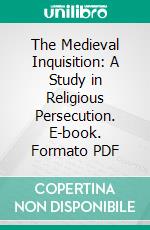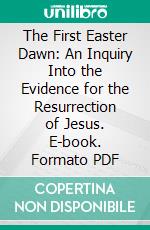Charles T Gorham eBooks
eBooks di Charles T Gorham di Formato Pdf
The Medieval Inquisition: A Study in Religious Persecution. E-book. Formato PDF Charles T. Gorham - Forgotten Books, 2017 -
Excommunication was imposed for tri?ing offences; but, however unjustly, the victim had for being reconciled to holy Church. The magni d cathedrals which are the glories Of architecture were to some extent an expression of religious faith, but even more of the clerical pride which reared them with money exacted from the poor. /preaching was almost wholly neglected, and this was one of the reasons why heresy became formidable}; Parish priests could not preach without special licence from the Bishops whose pre rogative preaching was, and by whom it was neglected because they were engrossed with worldly cares and pleasures and warlike duties. The Lord Bishop was first and foremost a man of war, especially in the thirteenth century. A story is told about the Bishop of Beauvais, one Of the most ruthless of these warriors for Christ, who, when captured by the English, com plained to the Pope that his privileges as a Churchman had been violated. In reply to the remonstrance of His Holiness, Richard I sent him the coat of mail in which the Bishop had been captured, with the Scriptural inquiry: Know whether it be thy son's coat or no. Benefices were Openly sold, or bestowed upon children, seven years being the minimum age fixed by some Popes for the clerical function. The abuses that grew out of the system of pluralities, the exactions connected with tithes, confessions, absolutions, marriages, funerals, were endless, a large part of the Church's wealth being derived from legacies which the fear of hell prompted the dying to leave at death or frequently to hand over during life.
The First Easter Dawn: An Inquiry Into the Evidence for the Resurrection of Jesus. E-book. Formato PDF Charles Turner Gorham - Forgotten Books, 2017 -
To the advanced Rationalist this book may seem super?uous. Miracles, some may say, are impossible, because they would con?ict with the universal law of causation. No evidence can prove a miracle. Why, then, trouble to examine the evidence for the resurrection of Jesus '2 But many sound thinkers decline to assume the impossibility of the miraculous, while remaining convinced that a dead man's return to life must always be more unlikely than the falsity of testimony to that effect. And as the haziest notions on this subject are still prevalent it has seemed desirable to group into one volume some of the principal objections to the orthodox doctrine as well as some examination of the main arguments in its favour.

